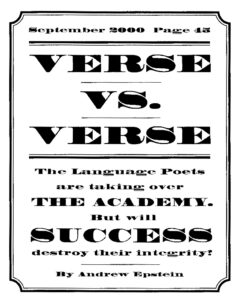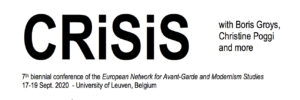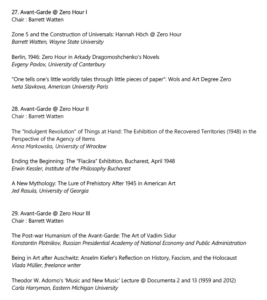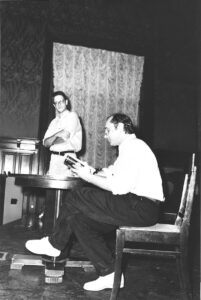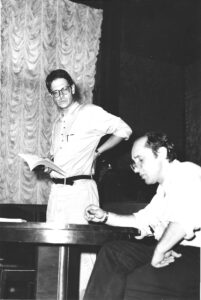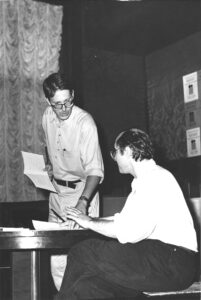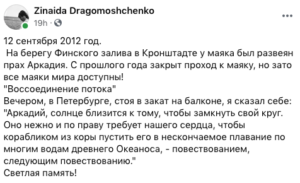Twenty years on, it is timely to reread the kind of discourse—or brazen publicity—that was circulated about Language writing and the academy, and indeed the entire project of poetics that was imagined as their synthesis, about 2000. In the two decades that followed, everything has changed in terms of the “horizon of expectation” that led to this premature discussion of the dominance of Language writing in the academy; in 2020, I will say confidently from my experience, and what I know of others’, that such a thing never happened. Perhaps it was meant not to happen, and the provocative title page to the September 2000 article in Lingua Franca by Andrew Epstein may be the reason why. As I work through my archive, I am finding numerous such signposts to futurity that did not arrive, while at the time I was caught up in the process, let us charitably say, of negotiating the “stakes at the table” of the future of Language writing. Why this discourse was misdirected, and for whose interests, will be the substance of my reading below; those interested may find, in the interest of time travel, the full text of the article here. … More
Entries published during September, 2020
Reflective sandboxing of software code within a machine built to parse it is seen in the case of a computer language like Java which must be compiled and then run as bytecode inside a special runtime environment, or, as with the language C, compiled and then run as “native” machine instructions, or with a simple mark-up language like HTML the specifications for which must be entirely designed into any browser destined to interpret and display it, or also with other interpreted code such as a three-dimensional model whose mathematical values for vertices and textures must be transcoded according to the rules of a given data format and given style of visual projection.
—Alexander Galloway, The Interface Effect (65)
The distinction between code as executable and language as interpretable has a basic horizon in the question of new meaning. Machinic encoding is not capable of making new meaning—only humans are. But caught in the web of mediated processes (as above), humans often fail to recognize the new—or attempt to transcode it in terms of earlier structures of interpretation. The example of the “failed mail art piece” will illustrate this. … More
September 16, 2020
Document 88: Crisis @ EAM
The weekend of 17–20 September was to have been seventh in a series of biennial conferences of the European Network for Avant-Garde and Modernist Studies (EAM). I have been presenting at EAM since their first meeting in Ghent, Belgium, in 2008. Each of the meetings that followed was remarkable, and opened a window onto new vistas on the aesthetics and politics, in fact the historical importance, of avant-garde and modernist studies—an expanding field that departs significantly from its Eurocentric origins and turns toward postcolonial and post-socialist contexts. The latter was encouraged by meetings in Poznan, Poland, and Helsinki, Finland, where I met a number of Eastern European scholars, and that connection is an important aspect of my organization of a seminar on “Avant-Garde @ Zero Hour.” The seminar was to focus on radical formal innovation in the crisis of the immediate postwar period, seeking different frameworks for the avant-garde than those that define the “historical avant-garde”—seeking a different register of the historical, in fact, one that eschews any form of progressive historicism for the crisis, destruction, discontinuity, and universality that attends the Zero Hour.
As it happened, the conference was canceled due to the current crisis. Much reflection may follow on the nature, and specificity, of “crisis” in its many instances. My proposal for the seminar may be found here; the conference CFP is linked here and above; and below is the line-up for our seminar. I will update this page with a link to full conference program soon; while the organizers have proposed a conference volume on our evolving understanding of crisis, with the avant-garde as both instance and guide.
September 12, 2020
Archive 06: Leningrad/ATD
There is a proliferation of anniversary dates this time of year. This one remembers our Summer School in Leningrad, August 1989, during the last days of Perestroika and the Soviet Union itself—thirty-one years ago. An international conference of avant-garde poets would not have been possible previously, and its meaning took part in that nearly evacuated moment—which we record in our nonnarrative history, Leningrad: American Writers in the Soviet Union. The grandiosity of our monumental title betrays the actual import of the event, which was all in the details—an occurrence that could happen once only, as its effective history. Which is always potential, always about to have an effect. Arkadii and I are pictured above, at the reading where I read in English followed by his translation. I would now say that it is the distance between the two figures that is most active and alive with possibility.
Today I saw Zinaida Dragomoshchenko’s post on, I assume, the scattering of Arkadii’s ashes in 2012, which adds to the historical prompt for my post. At another moment of distance, I want to read Zina’s tribute in Russian, which I screen capture without translating (and as the Cyrillic alphabet does not work on my site). Zina recalls the scattering of Arkadii’s ashes near the lighthouse at Kronstadt, in the Baltic off Petersburg, which has since closed, “but all the beacons of the world are available.” I wonder if the line in quotes, “Vossoyedineniye potoka,” translated as “stream reunion,” is from Arkadii’s works. Streams are coming together, converging. She returns to Petersburg and, speaking to herself, imagines the sun’s closing of a circle and a return “endless swimming” in the stream of Okeanos. She ends, in convergence across the space of eight years, “Svetlaya pamyat’!,” “Bright memory!”
Notes
Photographs: BW and Arkadii Dragomoshchenko, International Summer School, Leningrad, August 1989. Photographer: t/k.
Permission to reproduce screen shot.
